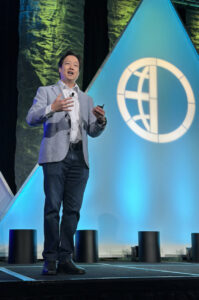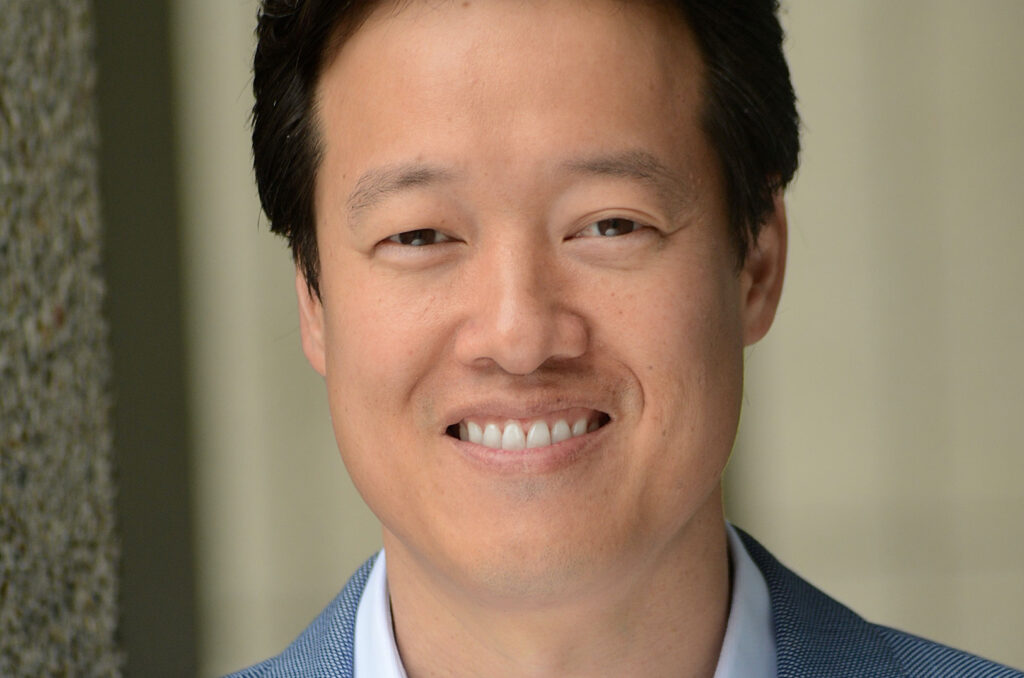when you want, where you want.
CJ Television
One issue cuts across all political lines: How it could be the antidote to a divided America
Entrepreneurship is a way to unify the United States at a time with great political division, said Victor Hwang.
“It’s an issue that cuts across party lines,” explained the founder and CEO of Right to Start. “And it’s something Americans really care about.”

Victor Hwang, Right to Start, speaks during an event with the International Economic Development Council; photo courtesy of Right to Start
Hwang, previously an executive at the Ewing Marion Kauffman Foundation, recently published his thoughts on entrepreneurship in an essay titled “How Bipartisan Support for Entrepreneurship Can Unite Divided Voters” on Inc. magazine’s site.
“Entrepreneurship — and the ability of everyone to be able to have access to start and build their own business — is one of the very few things that we all agree on,” he told Startland News. “And it’s one of the most important issues in the country.”
Right to Start — an organization that brings the voice of the entrepreneur into American public life and fights to expand entrepreneurial opportunity for all — conducted a bipartisan survey with two of the top pollsters in the country and asked voters what they think about entrepreneurship, Hwang said.
“It turns out no one had ever asked voters that before in terms of the broad voting public and how they thought of entrepreneurship as a civic and policy issue,” he continued. “And it turns out, it’s overwhelmingly bipartisan in its support. We found that 94 percent of Americans agree with the idea that it’s important to America’s future that every citizen has a fair opportunity to start and grow their own business.”
The pollsters said they’ve never encountered anything that unanimous before, he noted.
“There’s very, very few issues that have that level of appeal across party lines,” he added. “If you think about it, it’s the only major economic issue in America that everybody agrees on. So it’s in a unique, powerful place at a time when we seem divided about so many different things.”
Hwang said he doesn’t remember an election where entrepreneurship played a bigger role than the presidential election in November.
Vice President Kamala Harris’ campaign put entrepreneurship as one of her top economic opportunity policy issues. And President-elect Donald Trump’s campaign featured prominent entrepreneurs active in his campaign, taking a leadership role and helping craft his message and his agenda.
“So for the first time, we have an election where entrepreneurship was a very prominent issue,” Hwang explained. “It points to the fact that leaders are starting to realize that this is an issue of great importance.”
‘Rebooting our country again’
The recent presidential election also taught Hwang and others following political trends that people care about bread and butter issues, he noted.
“They want to know how they put food on the table and entrepreneurship does that,” he continued. “We need to make that case better — entrepreneurship is linked to the creation of almost all net job growth in the economy. It’s linked to higher incomes. It lifts up wealth across an entire community and helps fight poverty. A one percent increase in entrepreneurship leads to a two percent decrease in poverty.”
“So entrepreneurship is directly linked to the broader prosperity of an entire community,” he added. “We need to talk about that more.”
Only 18 percent of voters know that young businesses are the source of almost all net job growth, Hwang said.
“They think it’s bigger businesses and older businesses,” he explained. “They don’t know that the newer businesses are the ones that drive that.”
Another revelation from the election: people feel like something’s broken in the country — that something’s wrong with America and it’s just not working like it used to, Hwang said.
“There’s a sense of concern that we’re in decline or dysfunction and that there’s division,” he continued. “And I think entrepreneurs are the antidote for that.”
Entrepreneurs are the ones that build the future, he explained. They’re always looking at: How do you make things better? How do you build the next thing?
“For America to renew itself — to reboot our country again — the entrepreneurs will be at the very front of that,” he added. “So we should be, as a society, lifting up those people that are building that future again.”
Entrepreneurship: A 360-degree solution
The problem is that there are so many things getting in the way of people starting businesses, Hwang said, because entrepreneurship hasn’t been a priority in the economy and political system. So the first thing that needs to be done is to clear out all the barriers and obstacles to entrepreneurship at all levels of government.

Victor Hwang, Right to Start
“That’s not just red tape and regulations,” he explained. “If you think about all the things that stand in the way, it’s a 360-degree problem. Everything affects their ability to build businesses successfully from economic development issues to government contracts to access to healthcare, access to capital, access to childcare, affordably, access to workforce, good education, and entrepreneurial skills.”
We’ve never actually had a society that brought the voice of the entrepreneur into all of those issues, he noted.
“So that’s what we want to do is to break down the barriers,” he added. “So all those issues are things that don’t get in the way of entrepreneurs, but actually help them and accelerate them.”
Because entrepreneurs are busy and don’t often have the time and money to get involved, their voices often get lost, Hwang said, noting that’s where Right to Start comes in.
“We have a footprint in 34 states with people on the ground engaging in this issue, working with entrepreneurs, elevating their voices with our leaders in society, whether that’s elected officials or people in government or civic institutions,” he explained. “This is an issue that we’re lifting up, so we do that through active conversations, meetups, meetings, letter writing, petition signing, things that just make this issue prominent.”
The organization has gotten thousands of entrepreneurs involved and has seen success in several ways, he continued, including state legislation that has passed and been signed into law in Missouri and Nevada and governments in Kansas, New Mexico, Michigan, Maryland, and Indiana putting state officials in charge of entrepreneurship for the first time.
“This is all just in the last three years,” Hwang added. “A big focus of our work is we talk to governors’ offices and mayors and state legislators and we say, ‘Put someone in charge and name an official that actually takes care of entrepreneurs.’ It’s continuing to grow and there’s a groundswell and increasing momentum to do this.”
The City of Kansas City, Missouri, is a pioneer in this initiative, he noted.
“Nia Richardson and BizCare have really built probably one of the best offices in the country in supporting entrepreneurs of any city government in the entire country,” Hwang said. “Now we’re finding more and more cities want to copy that kind of effort, to have a one-stop shop and a place to bring the voice of the entrepreneur into city hall.”
The post One issue cuts across all political lines: How it could be the antidote to a divided America appeared first on Startland News.
All Rights Reserved. Copyright , Central Coast Communications, Inc.